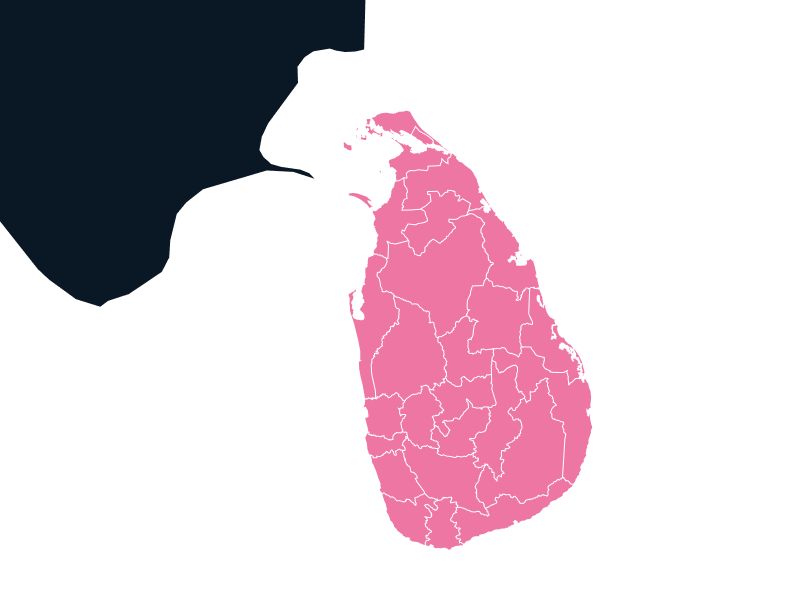North America
Export and Import to Sri Lanka
While Sri Lanka presents a wide array of opportunities, exporting and importing to Sri Lanka involves navigating several hurdles, from high import duties on certain products, especially tech and IT equipment, to strict regulations and documentation requirements.

Tax
Up to 13%
Duties
Up to 23%
Lead Times
4-5 Weeks
Restricted Items
Second-Hand and Refurbished Goods
Best Carrier Options
Courier or Freight Forwarder
Non-Working Days
Saturday, Sunday, and Public Holidays
Prominent Languages
Tamil and Sinhala
The Sri Lankan Trade Landscape
Sri Lanka’s position as a key hub in South Asia means it benefits from numerous trade agreements. The country is currently negotiating new FTAs, with Thailand being a key focus. Existing agreements with India, Pakistan, and Singapore allow businesses in Sri Lanka to access a broader market with reduced tariff barriers. This is particularly helpful for exporting from Sri Lanka to regional markets.
Sri Lanka’s access to the EU Generalized System of Preferences (GSP+) scheme is another significant opportunity for businesses involved in exporting from Sri Lanka. This program offers duty-free access to a wide range of goods, including textiles and fisheries, creating competitive advantages for Sri Lankan exporters. However, the GSP+ scheme also comes with stipulations that require Sri Lanka to advance human rights and sustainable development practices, which businesses must stay informed about to maintain access to this preferential treatment.
Population
23.19 M
Biggest Industry by Export
Tea
Capital Cities
Colombo; Sri Jayawardenepura Kotte
Biggest Industry by Import
Refined Petroleum
Common Pain Points When Importing to Sri Lanka
Despite these opportunities, several pain points that businesses must address when importing to Sri Lanka can make the process cumbersome and expensive. For example, any errors in the classification of products or the completion of customs paperwork could lead to delays or penalties, making it essential to work with experts familiar with Sri Lanka’s import regulations.
High Import Duties
The Sri Lankan government imposes relatively high import duties and taxes on IT and tech products. This can make products more expensive for local businesses and consumers, potentially limiting the market for imported goods.
Restrictions on Refurbished Goods
Sri Lanka has stringent regulations on the import of refurbished and second-hand technology. Businesses seeking to import pre-owned goods must be aware of these restrictions, which can create a barrier for certain markets.
Complex Customs Procedures
Navigating the customs landscape in Sri Lanka is no easy feat. The country’s customs regulations are multifaceted and may require approval from multiple government agencies. Without expert guidance, businesses can easily fall into the trap of misinterpreting regulations, which could lead to delays, fines, or even confiscation of goods.
Licensing and Quotas
Import licenses are required for many products, and certain goods are subject to additional quotas or restrictions. Understanding these requirements in advance is crucial to avoid bottlenecks in the supply chain.
Top Countries that Trade With Sri Lanka
Europe
The United Kingdom (UK)
Asia
India
Addressing Sri Lankan Compliance Challenges
Navigating the complexities of Sri Lanka’s import landscape can be a daunting task, but it doesn’t have to be. This is where an experienced import trade compliance partner like TecEx comes in. We specialize in managing the nuances of international trade and can help businesses overcome the challenges associated with importing to Sri Lanka.
One of the primary hurdles when working in Sri Lanka’s import environment is the often opaque nature of its regulations. Customs procedures are detailed, and failure to follow them to the letter can result in costly delays or penalties. Our team of experts is highly knowledgeable in Sri Lankan import laws and can guide you through the process, ensuring that all your documents are correctly filled out and submitted in time. We help you avoid mistakes that could otherwise lead to shipment disruptions.
Another significant challenge for businesses is understanding how to navigate the country’s import duties and taxes. High import taxes on tech products can be a major pain point for businesses, especially those in industries that rely on imported technology. We help clients identify the most cost-effective shipping solutions, utilizing strategies that minimize duties and ensure compliance with all local tax requirements.
Beyond the paperwork and compliance issues, businesses must also consider practical aspects of shipping to Sri Lanka. The humid, tropical climate can be tough on goods, particularly sensitive electronics. At TecEx, we ensure that your shipments are properly packaged and labeled to withstand these conditions, minimizing the risk of damage during international transit.
Unlock Opportunities in Sri Lanka’s Import Market
Whether you’re importing high-tech equipment, consumer goods, or raw materials, TecEx provides a comprehensive service that ensures your shipments comply with Sri Lanka’s standards, making your business operations smoother and more efficient.



